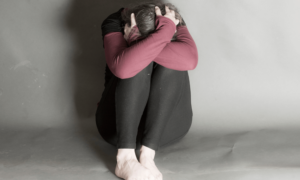This website uses cookies so that we can provide you with the best user experience possible. Cookie information is stored in your browser and performs functions such as recognising you when you return to our website and helping our team to understand which sections of the website you find most interesting and useful.
What is Trauma (Pt. 8) – In Your Brain & Body (2 of 3)

Today I’m talking about how trauma wires into your brain and body. Specifically, about your memories and belief systems, and how they get impacted and changed with trauma.
Laura
- April 2, 2024
Today we’re continuing our series on Trauma, by continuing our discussion on the science of how trauma wires into your brain and body. Specifically, we’re talking about your memories and belief systems, and how they get impacted and changed with trauma.
This series is here to help you understand what trauma is, what the signs and symptoms are, and how and why God created you in a way that includes trauma. We’ll cover the basics of this mental health dysfunction, all the way into some of the science of how it wires into your memories and nervous system. This will give you the foundation for understanding how to heal any trauma you may be carrying. Because trauma is one of the main causes of stress in life as a human.
This is the 8th in a series of 10 posts called “What is Trauma”. Learning about trauma can be overwhelming and even triggering. I encourage you to go slow, letting God lead you to where He needs you right now. And if at any point your get triggered and need help, there are free and paid resources linked at the bottom of each post. They’ll help you out of those triggers, back into the state of peace in your mind and body. You deserve that, so don’t shy away from help if you need it. I’m praying for you.
How Trauma Wires Into Your Brain & Body
Today I’m continuing our discussion on the science of how trauma wires into your brain and body. Specifically, I’m talking about your memories and belief systems, and how they get impacted and changed with trauma.
If you missed the previous post, I talked about how trauma wires into your survival brain (limbic system), creating triggers. I also introduced what trauma is, what the 5 different types of trauma are (Acute, Chronic, and Secondary, and Developmental, Complex and Complex PTSD). As well as what the signs and symptoms of trauma are (the main types, dissociation, and ACEs). These are great introductions into trauma and it’s symptoms, which will help understand the science we’re going to talk about today.
How Your Memories Change With Trauma
To understand how trauma changes your memories, you first need to understand how God designed your memories.
How God Designed Your Memories
SHORT & LONG TERM MEMORIES
God designed your brain to form memories in 2 different phases: short-term and long-term.
Short-term memories are the collection of details your brain has recorded from your day, which it houses in your conscious mind until you go to bed that night. You’ll have the ability to recall these details easily, at any time throughout your day.
Long-term memories are the collection of details your brain has recorded from your life, which it houses in your subconscious mind. These details have been re-organized to form both full memories of the events of your life, along with filters to search for similar details from multiple events (like all of your babies’ births).
At the end of the day, your brain goes through a process called cortical consolidation (presumed to be at night during REM sleep). This is a fancy term that means that your brain takes all the details from your short-term memories, and re-organizes them into long-term memories (with all the filters). This allows your brain to have your memories filed away in your subconscious mind, so your conscious mind can be clear for today’s memories. The old memories are still there for remembering at a later date, just neatly tucked away in long-term storage. Like when all of your paper files are neatly filed away in your filing cabinet. They’re available for when you need them, but they’re not cluttering up your desk today.
While your brain is in REM sleep consolidating all of your memories from the day, you’ll be aware of details from those memories through your dreams. As your brain “files these details away” into long-term storage, your awareness of them will create a random story in your brain that you know of as a dream. When your memories are calm and peaceful, your dreams are typically calm and peaceful. When your memories are stressful and/or traumatic, your dreams are typically stressful and traumatic.
TYPES OF MEMORIES
God designed your memories to be made up of 4 different types of memories (split into 2 different categories).
These types include:
EXPLICIT MEMORIES:
Your conscious, intentional recollection of factual information, of previous experiences and concepts (like trying to remember someone’s name)
Semantic Memories: your memories of general knowledge and facts (especially when you were young, like what bike you had as a child)
Episodic Memories: your autobiographical memories of events or experiences; including who, what and where (like remembering riding a bike as a child – what it was like, including the sights, sounds, and how scary it was to hit the rock and fall)
IMPLICIT MEMORIES:
Your unconscious, automatic recollection of information that affects thoughts and behaviors
Procedural Memories: your memories of how to perform common tasks without actively think about them (like how to ride a bike, without having to stop and recall how it’s done)
Emotional Memories: your memories of the emotions you felt during events or experiences (like the next time you see your bike, you’re flooded with embarrassment, because people saw you when you fell, which was an awkward and vulnerable moment).
Explicit memories are formed in your hippocampus (part of your limbic system), and begin being created between 2-3 years old. Prior to that time, your hippocampus isn’t “online” yet to record these details of your life. Any memories you have from before 2-3 years old will be different than these, because they don’t have the factual story to go with them.
Implicit memories use past experiences to remember things without thinking about them. They’re enabled by your previous experiences, no matter how long ago they were. And can affect your thoughts and behaviors, without you realizing why or how.
Your brain can’t hold every memory from your entire life in long-term storage, so God designed it to remember the events that were most impactful. These are the event where you had moderate to high emotional reactions (like your wedding day, children’s births; or Israel being attacked by Hamas).
How Trauma Changes Your Memories
When you go through something scary, life-altering or life-threatening, and you traumatize, your memories of that event will be different than your regular memories.
SHORT-TERM & LONG-TERM MEMORIES CHANGED
When you traumatize, your REM sleep is disturbed. This disturbance impairs your brain’s ability to consolidate (re-organize) your trauma memories from short-term to long-term memories. This means that your trauma memories will be stuck in your conscious mind, available for recall at any time. Which is why when you have trauma, those memories are in your awareness, as if they just happened.
You’ll also notice that your dreams may seem dark, scary and on repeat. This is because your short-term memory includes both today’s memories along with your past traumatic memories. When your brain tries to consolidate them all, you’ll relive details of both today’s and the dark, scary traumatic ones. Since the trauma is unhealed and unable to be consolidated, it remains in your short-term memory, and your dark, scary dreams will be repeated night after night (until you heal your trauma).
TYPES OF MEMORIES CHANGED
When you traumatize, your brain suppresses part of itself (your hippocampus), so that you don’t have to remember everything that just happened to you.
Your implicit memory of the event (your unconscious, automatic memories) will be fully functional. This is because they’re recorded in your amygdala, which is active and online when you’re traumatizing. These memories will be recorded as fragments of memory details (not the full chronological story), resembling a collection of puzzle pieces that haven’t been pieced together yet.
This means that you’ll remember things like:
- Emotions
- How it felt in your body
- Your senses (what you saw, smelled, heard, tasted, felt or touched)
- Your impulses to fight or flee
- Flashes of images of what you saw (but not in a full movie of the entire event)
Your explicit memories of the event (your conscious, intentional memories) will be impaired. This is because they’re recorded in your hippocampus (which has now been suppressed, and is half offline). These memories are the ones that piece together the factual timeline of events (first this, then that, then that). Not having these memories recorded means you won’t have a full chronological story of the event.
This means that you won’t remember things like:
- Facts and details
- Who was there
- What fully happened (especially the chronological order of things)
- Where it all took place
While this can seem unfair, it’s actually a gift from God, to keep you from reliving the whole memory all over again. You don’t deserve to relive those horrors day-in and day-out. It does mean, though, that you’re not going to be able to tell a complete story of what happened to you. You’ll only be able to remember details, like what your 5 senses experienced, the feelings you felt in your body and the emotions you felt during it. This can become challenging when those details can help with criminal cases against abusers.
Later on in life when you try to recall the memory, you may find that you’re only able to bring up certain details of it, not the whole thing. Or you may find that you’re not able to bring any details of it up. Your brain has locked it (or parts of it) away to protect you. This is either from reliving it again, or from people who may bug you for not remembering the whole story (like an abuser who wants to stop the legal case against them).
Even if you can’t recall the memory at all, you will still experience the signs and symptoms of the trauma, but you won’t understand where they’re coming from.
Here’s a chart to explain this more concisely:
MEMORY
EXPLICIT
IMPLICIT
(puzzle pieces of the memory are unassembled)
Part of Mind:
Conscious
Unconscious
Includes:
Cognitive, facts, mind, verbal / semantic, descriptive of operations, description of procedures
Emotional, conditioning, body, sensory, automatic skills, automatic procedures
Part of Brain Formed In:
Hippocampus
Amygdala
When Memories Come Online:
~ 3 years old
From birth
Activity During Traumatic Event and/or Flashback:
Suppressed
Activated
Narrative of Event:
Chronological story of event
None
How Your Belief Systems Change With Trauma
To understand how trauma changes your belief systems, you first need to understand how God designed your belief systems.
How God Designed Your Belief Systems
God designed your brain to carry a set of beliefs (called belief systems) that are “hard-wired” into you. These beliefs help you wake up every morning and know what you believe and value in life (about God, yourself and the world around you).
For the first 7 years of your life, He designed your brain to live in a theta brain wave state. This is the state of dreams, imagination, creativity and hypnosis. Being in this state 24/7 allowed your brain to be a sponge to the world around you, soaking up all the facts and rules of your world. (It also gave you an incredible imagination for play).
Your brain wasn’t pre-wired with the belief systems you needed to carry for life. God designed you to experience the world around you, and let your brain decide those for itself during those first 7 years. (Him giving you the free will to believe what you wanted).
Once they’re wired in, they become the programming of your life (similar to the software on your tech devices). Your beliefs, thoughts, actions and behaviors all stem from the belief systems that are “hard-wired” into your brain. They’re set in place, so you don’t have to re-create them out day-in and day-out. This is really helpful when they’re good, and challenging when they’re not.
When you’re raised in a loving home without sin, your brain absorbs those loving facts and rules, and creates healthy belief systems based on them. When you’re raised in a broken home with sin (which we all were), your brain absorbs those broken sin-filled facts and rules, and creates unhealthy belief systems based on them.
Your brain likely created some (if not many) belief systems that are loving. These are called empowering beliefs. They’re the ones helping you function and thrive in your life.
If there was a lot of pain, fear or abuse, it’s likely that your brain also created some belief systems (maybe many) that are un-loving. These are called limiting (or negative) beliefs. They’re the ones hurting your ability to function and thrive in your life.
These beliefs are “hard-wired” into your brain during your first 7 years of life. Once your brain shifts out of the theta brain wave state, you’ll run on these beliefs every single day, whether you want to or not (until you heal your trauma and re-wire these beliefs).
How Trauma Changes Changes Your Belief Systems
Trauma is one of the main sources of the limiting beliefs wired into your brain. It either created these limiting beliefs during the hard events of your childhood, or changed them later in life when you went through something life-altering or life-threatening.
IN CHILDHOOD
As a little kid, you’re brain wasn’t developed enough to understand the hard (and possibly scary) things going on around you. It was in the land of creativity and imagination (play), being a sponge, soaking up all the facts and rules around you.
Whether or not the things you experienced were good, your brain perceived them as the facts and rules of life. It created belief systems about yourself, based on them, and wired these beliefs into your brain.
These beliefs include:
- I’m not safe, I’ll never be safe
- No one’s protecting me
- It’s not safe to be me
- I’m not loved, I’m unlovable
- I’m worthless
- No one cares about me
- No one notices me
- Who I am isn’t good / is bad and broken
- God doesn’t love or care about me
- God isn’t real
- (… and so on)
(Since your child brain wasn’t developed yet, you often misinterpreted the situations where pain existed, and blamed yourself for it. Which is why these beliefs are all about your lack of worth, identity and safety in life).
As you read this list, you may find ones that hit home for you.
You may also see how these have nothing to do with the abuse that was inflicted on you. You never caused or deserved those bad things. But it’s possible that your brain has believed that you did, and created limiting beliefs out of them.
LATER IN LIFE
When you go through something life-altering or life-threatening later in life, and your brain wounds with trauma, it can change (re-wire) your belief systems. This trauma can leave your brain confused and scared, believing that your current belief systems aren’t keeping you safe. It’ll believe that they need to be changed (re-wired) in order to protect you.
When this happens, your brain re-wires (changes) your original belief systems, often replacing empowering beliefs with limiting ones. This hinders your ability to function and thrive in your life post-trauma. While it’s doing the best it can to keep you safe and alive in your life, this is an overreaction due to the trauma, and ends up hurting you in the end.
Once your brain has been re-wired with limiting beliefs, it’ll run your life based on those beliefs every day moving forward (until you heal your trauma and re-wire you beliefs back to empowering ones).
The Good News
When you heal your trauma, your brain will heal your memories (removing any pain, emotions and triggers from them) and re-wire your belief system to empowering ones.
Sometimes it does this on it’s own, but often it’s done with the proper guidance from a trauma-informed therapist or trauma coach.
How Trauma Wires Into Your Nervous System & Body
In the next post, I’m continuing our discussion on how trauma wires into your brain and body, by talking about how trauma wires into your nervous system and body.
Do You Have Trauma and Need Help with Your Triggers?
If you’re struggling with trauma triggers and life-altering effects they bring, I have resources for you.
While I always encourage healing in 1-on-1 sessions with a therapist or trauma coach, you’re also going to need help in between those sessions.
Here is a free video of one of my favorite mental health techniques for turning off trauma triggers. It’s a quick 5 minute exercise that will shift you back into the state of peace in your mind and body.
I also have a full Membership of videos and audios (just like the free one) to help you turn off your triggers anytime, anywhere. Some are short exercises to turn off your triggers quickly so you can get back to your life, while others are longer opportunities to turn off your triggers and release the hard emotions that came with them.
You deserve to live and thrive in the state of peace in your mind and body. And God wants that for you.
If you’re struggling with trauma and the damaging effects of it, know that it’s not only ok to get help. It’s beautiful.
From one survivor of this hard life to another,
I’m praying for you ♥︎
– L aura
Related Posts
Want Laura On Your Blog?
Ready to Find Peace in Your Mind and Body?
Join the
Stress Release
for Christian Women Newsletter
mental health resources and encouragement for turning off your stress, releasing your emotions and coming back to the state of peace in your mind and body.




